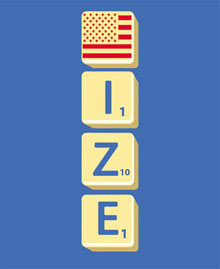
Mind your English language
While most people accept that language will change with use and time, Sarah Churchwell appears to justify the increasing Americanisation of British English (A neologism thang, innit, 10 May). Noah Webster
may have produced the language that should be known as "American", but
that should not be a reason, as Churchwell seems to imply, for British
English to be altered to the American version. American is characterised
by a plethora of "z"s and a paucity of "u"s, which doesn't even reflect
the way we pronounce many of the affected words. Churchwell seems to
view the French influence on our language as in need of purging. This
has no justification. The French influence is part of the Latin history
of English, as is the impact of Spanish and Italian.
American
terms and spelling are imposed on us via the internet, but television
and lazy journalism are also to blame. Not only is it "new" words, but
creating verbs from nouns is common. Witness her own example
"hierarchize". American versions of words are too common, as in
"bathroom" or "rest room" for toilet, "airplane" for aeroplane, and
"stroller" for buggy. Our English is a rich and varied language – it
needs a strong defence.
John Edwards
Linlithgow, West Lothian
• There's no need for Sarah Churchwell to come back to these shores
and feel the underdog, just because she's an ex-colonial speaker of
English. As such she must know that language, above all, is social. She
condemns "innit" but not "gotten" because, at the moment, the former
usage is English underclass and the latter American mainstream. They
both sound horrible, or OK, according to taste; some even think they are
"cool", democratic, like.
But no amount of genealogical research
citing Shakespeare will effectively whitewash the social meaning of
each. They are abominable not because they sound awful, but because they
represent a depressed and depressing social status in England, on the
one hand, and a bland, thoughtless, faux-classless, sold-by-the-yard
cultural wallpaper from the US, on the other.
Dr James Andrade
St Albans, Hertfordshire
•
What a pity Sarah Churchwell spoils her otherwise well-made case about
the inevitability of language change by a careless remark in her final
paragraph: "From an aesthetic standpoint, 'innit' remains an
abomination." Perhaps this was intended as tongue-in-cheek, but if so, I
doubt it will be interpreted as such by the purists she mentions. And
if not, then Prof Churchwell of all people must know there's no such
thing as intrinsically aesthetically inferior (or superior) language. As
her article demonstrates, it's a matter of personal preference and
prejudice.
Prof Jennifer Jenkins
Chair of Global Englishes, University of Southampton
•
I agree with Sarah Churchwell's attitude to the evolution of English,
but I wish to defend "innit", which she categorises as an abomination.
Most languages have a simple way of designating a question expecting the
answer "yes", eg "n'est ce pas?" or "nich wahr?". English has instead a
bewildering variety of phrases – "didn't he?", "won't they?", "am I
not?" – which have to be crafted for each context, a task which some
non-native speakers find difficult. "Innit" fills the vacant role of a
generic verbal question-mark inviting agreement. I predict that it will
achieve the accolade of inclusion in the OED well before such redundant
items as "grrl".
Herbert Munk
Coventry
•
I can explain to Sarah Churchwell why Scrabblers prefer the word
"amongst" to "among". Using all seven tiles at once gains a bonus of 50
points. To begin a debate, it would be interesting to learn the strength
of feeling amongst players who believe one should always know the
definition of their chosen word.
Mollie Holden
Westgate-on-sea, Kent
•
The ending of "vendor" and "neighbour" is pronounced differently on
both sides of the Atlantic. Not just kowtowing to the French!
Alexander Good
London